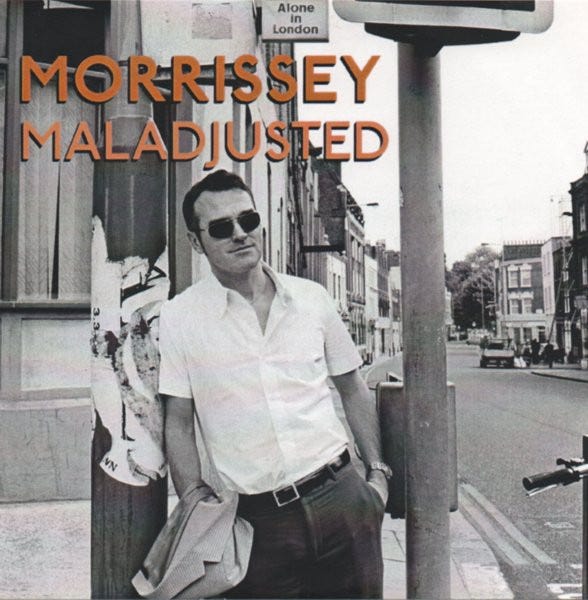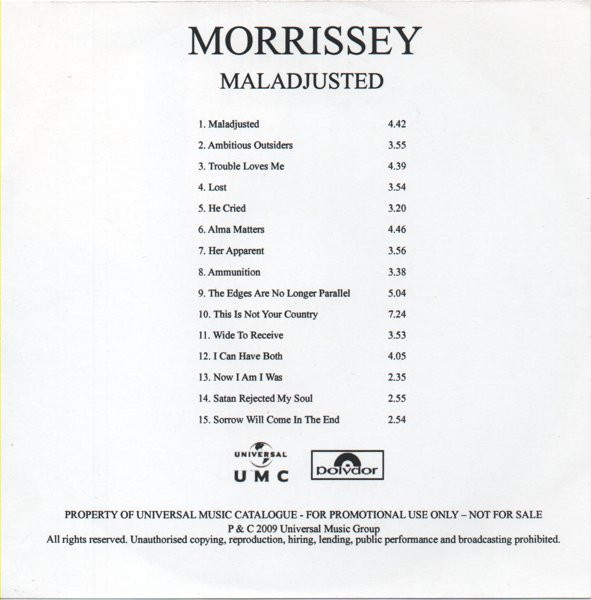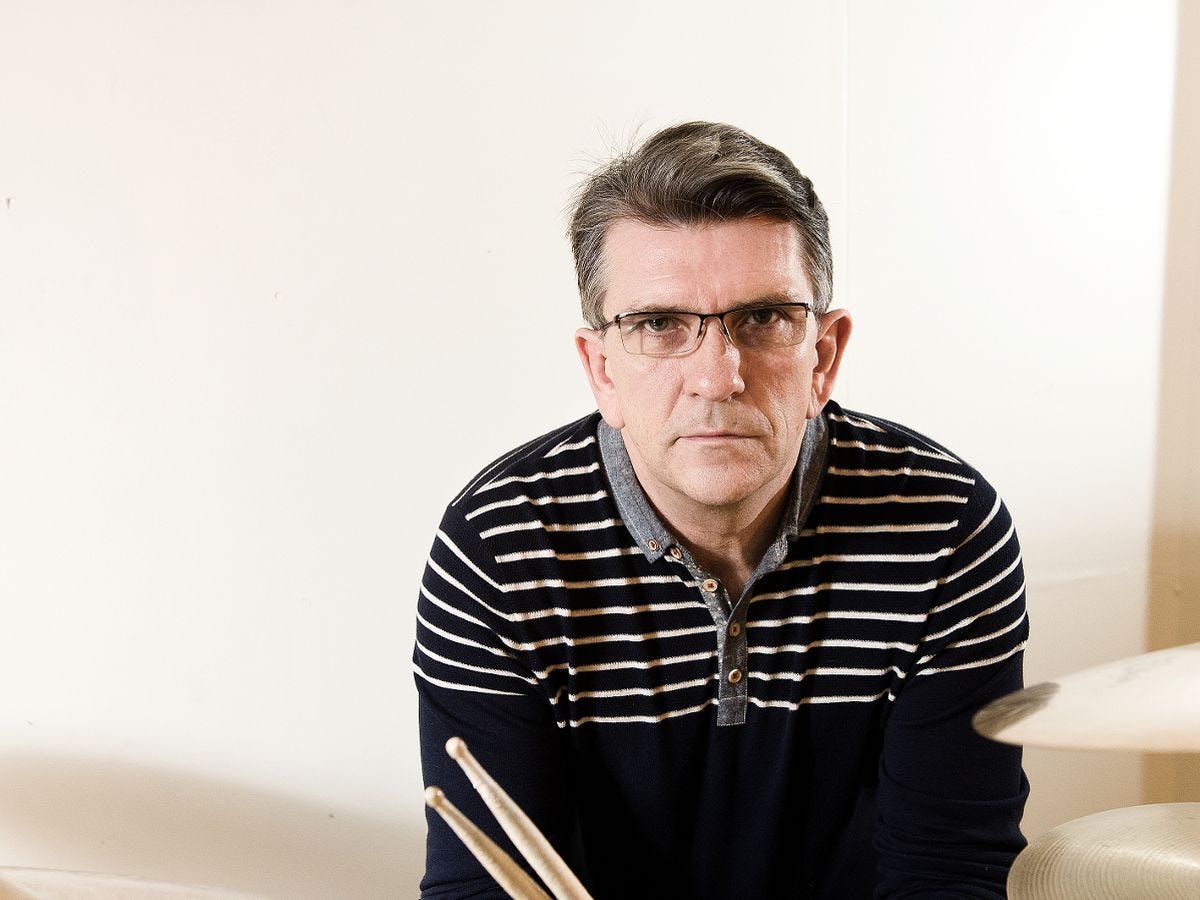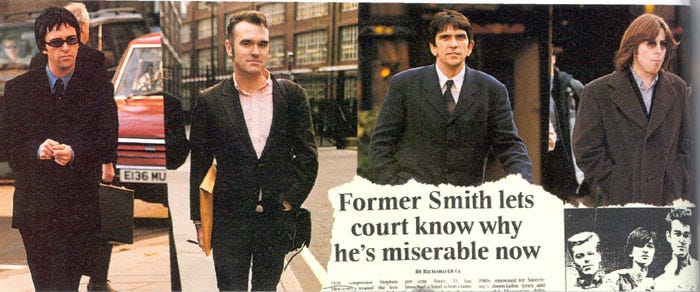'Sorrow Will Come In The End' is the penultimate track on Maladjusted, Morrissey's sixth studio album, which was released on August 11, 1997. A spoken word track, Morrissey intones over a backing of manic, carnivalesque strings and the beat of a judge's gavel. Listen to the song here:
The song is clearly about Mike Joyce and his royalties lawsuit, and is an extended, threatening message to Joyce and his representatives with lines such as "Don't close your eyes/Don't ever close your eyes/A man who slits throats/Has time on his hands/And I'm gonna get you" and “I praise the day that brings you pain”. Morrissey's record label at the time (Island Records) omitted the track from the UK release of the album for fear of libel action on Mike Joyce’s part.
The passage of time (and all of its crimes!), along with a new record label, apparently dispelled concerns over a potential libel action as 'Sorrow Will Come In The End' was included on the UK release of the remastered and redesigned version of Maladjusted in May 2009.
For his part, Joyce said of the song, "I just found it funny. If Lemmy had written it, I might be concerned."
Mike Joyce's Lawsuit
In 1989 Mike Joyce sued former colleagues Johnny Marr and Morrissey over royalties from his time with the Smiths. The case eventually made it to High Court in the UK in 1996. Joyce alleged that he should have received 25% of recording and performance royalties earned by the Smiths. Joyce sought at least £1 million in damages and 25% of all future Smiths album sales. After a seven-day hearing, the judge ruled in favour of Joyce, who was awarded damages of around £1 million from Morrissey and Marr. In summing up the case, Judge Justice Weeks referred to Morrissey as "devious, truculent and unreliable when his own interests were at stake", with the words "devious" and "truculent" being widely used in press coverage of the ruling.
While Marr simply paid his share of the money owed to Joyce, Morrissey launched an appeal against the ruling. Among other things, Morrissey said that the judge had been biased against him. Morrissey lost his appeal in July 1998 and then launched another soon after. This too was unsuccessful. In a November 2005 statement, Morrissey said that Joyce had cost him £600,000 in legal fees alone and approximately £1,515,000 in total. Morrissey sarcastically refers to Mike Joyce as the 'it's not about money' drummer in Autobiography. Morrissey devotes a considerable amount of space to the lawsuit in Autobiography, and for the purpose of succinctness this post will be limited to Marr's thoughts and recollections on the matter.
Johnny Marr's recollection of the financial arrangement agreed to by the Smiths
“Morrissey and I would meet up in the morning in Piccadilly, walk to the studio and plan what was happening next. We were on our way to record ‘What Difference Does It Make?’ when the subject of financial arrangements came up. I wasn’t thinking that we would actually make much money at that point, playing the weird songs that we did on an indie label, but we decided that we would split the income for the group with 40 per cent each for me and Morrissey, and 10 per cent each to the other band members, seeing as we ran the band. However much I’d have liked to have thought that The Smiths were made up of equals, we weren’t, and unlike some bands The Smiths didn’t fall into being a band together. Like all bands starting out, none of us liked discussing the financial arrangements. I wanted to continue making the record, and I didn’t want to deal with it so I put it off. Joe [Moss]1 talked me round and said he’d straighten it out, and then he called a meeting between me, Mike and Andy the next day. I told them the situation had to be resolved and said that if they didn’t want to go ahead, I understood, and, as disastrous as it was, I’d go and do something else with Joe. We all talked about it and the next day we were back to normal and it was like nothing had happened. We didn’t even think to put it in writing. It would’ve been a good idea if we had as the uneven split of The Smiths’ royalties would eventually boil over into a court case, in which Mike and Andy denied they had ever agreed to an unequal split.”
Johnny Marr's thoughts on, and recollections of, Mike Joyce's suit
“Mike Joyce had served a writ against Morrissey and me, claiming that he was a partner in The Smiths and because there was no agreement to say otherwise he was an equal partner. This was based on the Partnership Act of 1890, which says that unless there is a clear agreement all partnerships are equal; he was therefore entitled to an equal share of the band’s recording and live earnings. Andy was part of this action too, but he settled and agreed to take 10 per cent in the future. My position was that Mike had agreed to 10 per cent of the band’s earnings when the band decided the splits on a very emotional day in Pluto Studios in 1983. Mike argued that he never knew what the splits were, and as it had never been written down and signed, he was entitled to 25 per cent of the profits. It turned out in the evidence at trial that, through our disorganization, the splits had not been consistent. It seemed odd to me that you could be in a band with three other people for five years and not know what everyone’s splits were; no one had disputed or rejected the finances at any time during the five years when the band was together. The Smiths as a band were not equal. People might want to think otherwise, but anyone who was around us in any capacity would tell you that The Smiths were not a band of equals. Morrissey and I formed it, and apart from the first year when Joe was with us we managed it, and usually managers take 20 per cent of a band’s income before the band members take their share. We had the legal obligations and the responsibilities, and it was our names on the contracts. We hired everyone and fired everyone, and we ran everything with the record company. Morrissey did all the artwork and I produced most of the records. It would be nice to think that we all did as much as each other, but we didn’t, and in that respect it was more like The Kinks, or Kraftwerk, where the two founder members are in charge. It’s that way in many other bands, and that’s how it was in The Smiths. If Mike Joyce wasn’t happy with a 10 per cent share, he should have walked. He should have said, ‘I’m not happy about this, get another drummer.’ I was surprised by the legal action, but I wasn’t hurt by it."
"When Morrissey took the stand, it was uncomfortable from the word go. He argued with the judge, who was surly and pompous, and at one point Morrissey lost his temper and walked off the stand in frustration. Mike’s barrister made sure he planted a few bombs for the court and the media by putting it to Morrissey that he regarded his bandmates as ‘replaceable as parts on a lawnmower’. I watched the reporters as they devoured that phrase and scribbled it down, and a couple of them exited to phone their editor – job done, now everyone had ‘the angle’. The phrase became assimilated into the newspaper reports and then the proceedings as if it had been said by Morrissey which it hadn’t: Mike’s barrister had planted it. He knew exactly what he was doing and it worked. The judge fell for it, and the press fell for it, then the public fell for it. I watched the bullshit and it was like being bound and gagged while everyone threw dirt around. For the band to be wrung out like this and put in such a lowly position was degrading, not only because we were arguing over money, but because to me The Smiths were too cool to end up like that. I’d tried to find a way to settle it without having to go to court, but I couldn’t achieve a settlement on my own. With each minute I grew more and more disdainful of the whole thing. I didn’t respect anyone on either side, including my own. I envisaged the barristers and lawyers sitting around together after the day’s hearing, scoring points and exchanging quips about how each other had done. To them it was all in a day’s work, and we were just rock stars with unlimited amounts of money that we’d acquired easily in the fame game. They couldn’t imagine they were desecrating someone’s dream; to them it was ‘just business’. Having to listen to the story of The Smiths told in such twisted terms by cunning cronies with no understanding of what a band is about was galling and grotesque. Every bit of love the band had for what it did and for each other was extinguished and interpreted in the worst possible light until there was nothing left."
All four members of the band were called to the stand. I knew there was no point in trying to be clever, and by then I was under no illusions that Morrissey and I might win. I just answered as directly as I could, without letting Mike’s barrister succeed in winding me up. I’d been forced to go to court, and I decided that whatever happened I was going to speak up for myself and get the satisfaction of putting a few things straight. At least that way I’d have no regrets and I could walk out of there my own man. When the judge ruled in Mike’s favor, he made a point of sticking it to me and particularly to Morrissey, who he really didn’t like, making remarks about him that were personal and fairly shocking. As well as giving Mike everything he’d asked for, he also ruled that Morrissey and I pay for Mike’s legal costs, which for the previous seven years had already been paid for by legal aid.”
Ultimately, there may have been no winner in this dispute. Regardless of the court finding in favor of Joyce, the real cost of this matter may very have been any possibility of any type of Smiths revival or reunion, however brief. While Marr appears to have left the matter in the past, Morrissey was sorely stung by Joyce’s efforts, both to pursue the matter and to collect upon his monetary award (Autobiography details Joyce’s efforts to collect by way of Morrissey’s mother and sister, who each owned property in their own names. Likewise, Morrissey’s royalties were attached by Joyce, effectively cutting off his primary source of income for many years). In the end, those who love and admire the Smiths were the biggest losers in this sad chapter of their legacy.
The lyrics for 'Sorrow Will Come In The End'
Legalized theft
leaves me bereft
I get it straight in the neck
(somehow expecting no less)
a court of justice
with no use for Truth
Lawyer ...liar
lawyer ...liar
you pleaded and squealed
and you think you've won
but Sorrow will come
to you in the end
and as sure as my words are pure
I praise the day that brings you pain
Q.C.'s obssessed with sleaze
frantic for Fame
they're all on the game
they just use a different name
You lied
and you were believed
by a J.P. senile and vile
you pleaded and squealed
and you think you've won
but Sorrow will come
to you in the end
and as sure as my words are pure
I praise the day that brings you pain
so don't close your eyes
don't close your eyes
a man who slits throats
has time on his hands
and I'm gonna get you
so don't close your eyes
don't ever close your eyes
you think you've won
oh no
Joe Moss was the Smiths' first manager. When the Smiths formed, Moss secured the group with a rehearsal space as well as a PA and a van, and began to guide them through the early stages of their career, finding them record contracts for the UK and America as well as publishing and agency deals. In late 1983, on the eve of the band’s first trip to the US after the release of This Charming Man, Moss quit unexpectedly. Johnny Marr said of Moss "Without him there wouldn’t have been any Smiths." Joe Moss passed away in 2015.










As much as I love this song a small part of me cringes. I just feel uncomfortable with this situation.